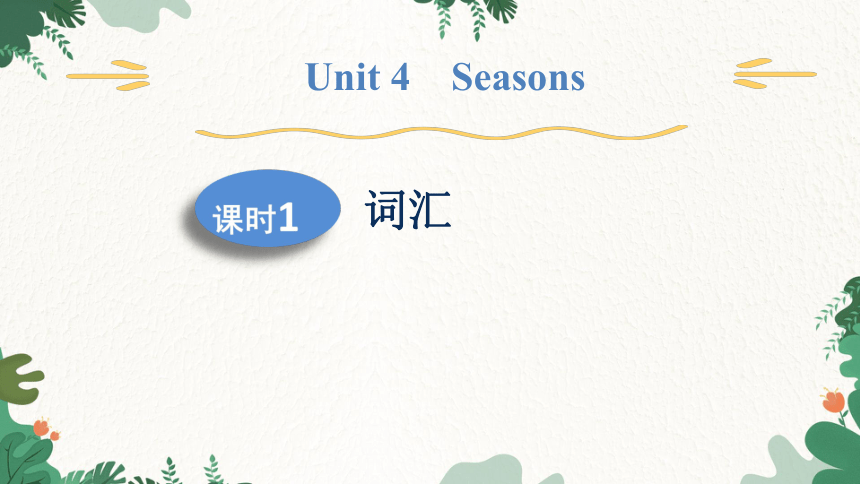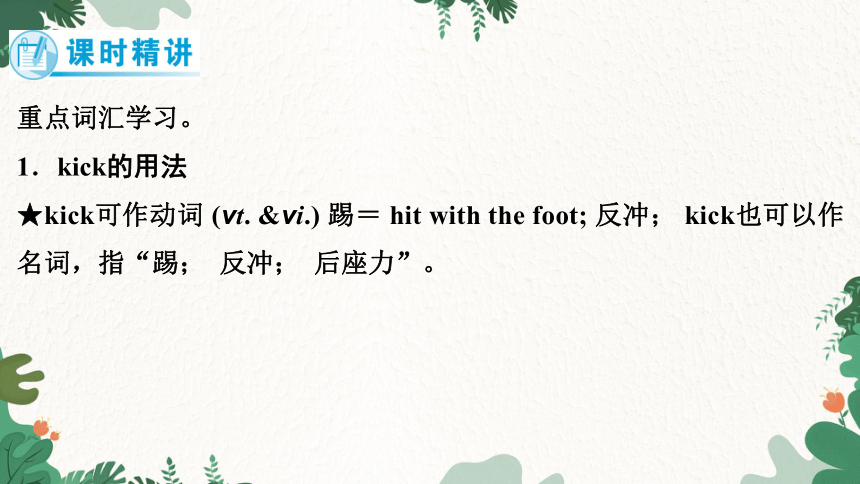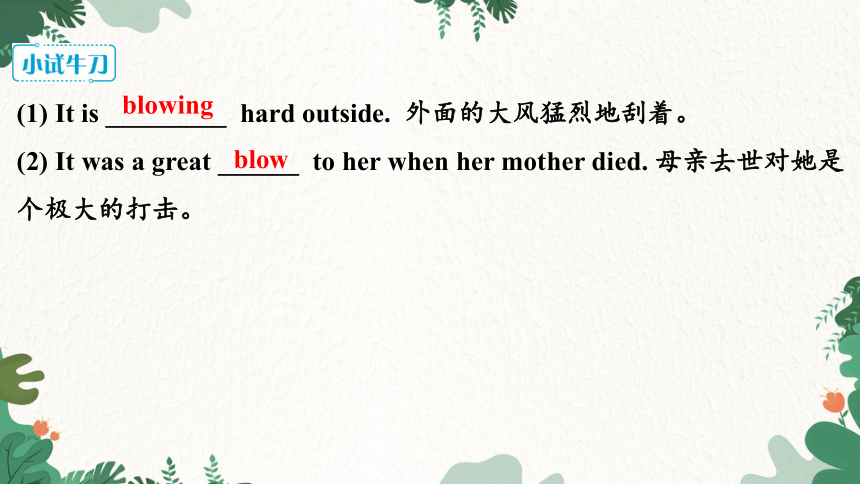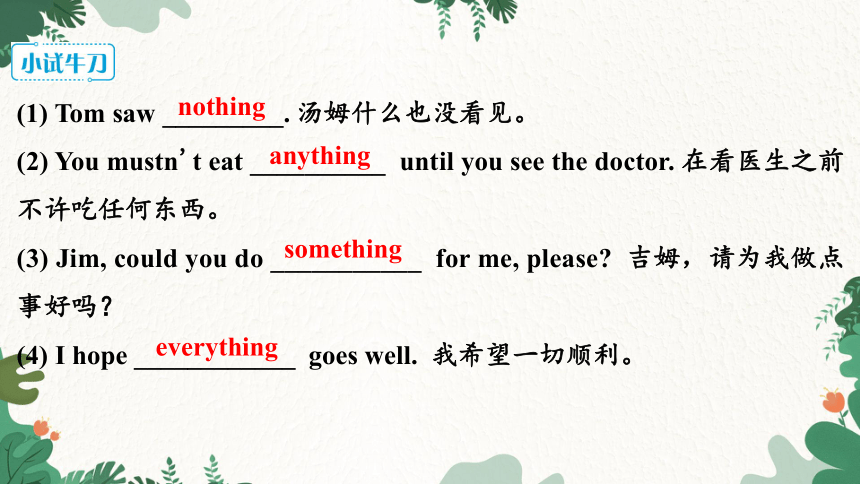牛津深圳版七年级上册Module 2 The natural world Unit 4课时1词汇课件(共21张PPT)
文档属性
| 名称 | 牛津深圳版七年级上册Module 2 The natural world Unit 4课时1词汇课件(共21张PPT) |  | |
| 格式 | pptx | ||
| 文件大小 | 2.2MB | ||
| 资源类型 | 教案 | ||
| 版本资源 | 牛津深圳版 | ||
| 科目 | 英语 | ||
| 更新时间 | 2023-08-02 08:23:28 | ||
图片预览









文档简介
(共21张PPT)
Unit 4 Seasons
课时1
词汇
一
课时精讲
三
四基三级练
二
课时过关
重点词汇学习。
1.kick的用法
★kick可作动词 (vt. &vi.) 踢= hit with the foot; 反冲; kick也可以作名词,指“踢; 反冲; 后座力”。
(1) It's not allowed _________ another player in the football match.
足球比赛中不允许踢另一位球员。
(2) He gave the table an angry ______. 他狠狠地朝桌子踢了一脚。
(3) It is a rifle with a heavy ______. 这是一把后座力很大的步枪。
to kick
kick
kick
2.blow的用法
★blow既可以作动词也可以作名词,用作动词,表示“吹”; 用作名词,表示“打击”。如:
He struck me heavily. = He gave me a heavy blow. 他给我重重的一击。
★相关短语:blow over 安然过去,平息; blow up at sb. 训斥某人
(1) It is _________ hard outside. 外面的大风猛烈地刮着。
(2) It was a great ______ to her when her mother died. 母亲去世对她是个极大的打击。
blowing
blow
3.everything, something, anything, nothing的用法区别
★everything, something, anything, nothing 均为指物的复合不定代词,它们作主语时,谓语动词常用单数形式。everything 意为“每件事; 一切事”,可用于肯定句、疑问句或否定句中。something意为“某事; 某物”,常用于肯定句中,也可用于征求对方意见的疑问句中。anything意为“某事; 任何事”,一般用于否定句或疑问句中。nothing意为“没有什么; 没有东西”。
(1) Tom saw _________. 汤姆什么也没看见。
(2) You mustn't eat __________ until you see the doctor. 在看医生之前不许吃任何东西。
(3) Jim, could you do ___________ for me, please 吉姆,请为我做点事好吗?
(4) I hope ____________ goes well. 我希望一切顺利。
nothing
anything
something
everything
4.journey, trip, tour, travel的用法区别
★ (1) journey 通常指远距离的陆地旅行,有时也可以表示经常走的“路程”或“旅途”。
(2) trip一般指时间短、距离近的“旅行、出行”,在非正式用语中也可以指长途旅行,可代替journey。只作名词。
(3) tour着重指旅行线路比较曲折,常表示“ (周游各地的) 参观、访问、 (巡回) 环游、视察”等意思。可作动词和名词。
(4) travel一般指长途旅行,或到国外或远方旅行。与journey不同之处,在于不着重某一目的地,有到各地游历的意思,作名词时常用复数形式。
(1) He is fond of _________ (= travelling).他喜欢旅行。
(2) Light _________ faster than sound. 光速比声音的速度更快。
(3) I am going on a _______________ to the seaside during the summer holidays.
暑假期间我将去海边旅行。
(4) He is making a ______ of the world. 他周游世界去了。
(5) — How long is your _________ to school 你去上学的路程有多长?
— Only about 10 minutes. 大约10分钟。
touring
travels
journey/trip
tour
journey
5.shine的用法
★用作动词,指“照耀,发光”; 用作名词,指“阳光 (sunshine),光泽”; put a shine on 把……擦亮。同义词light/beam光线。动词过去式:shone/shined; 动词过去分词:shone/shined; 动词现在分词: shining。形容词为shiny。
(1) ________ your torch into the drawer. 你用手电筒照一下这抽屉里面。
(2) The Sun ________ brightly. 太阳明亮地闪耀着。
(3) Your shoes need a _______. 你的鞋子需要擦一擦。
Shine
shines
shine
6.spend, cost, take和pay的用法区别
★spend的主语必须是人,常用于以下结构:
(1) spend time/money on sth. 在……上花费时间 (金钱)。如:
I spent two hours on this Maths problem.
这道数学题花了我两个小时。
(2) spend time/money (in) doing sth. 花费时间 (金钱) 做某事。如:
They spent two years (in) building this bridge.
造这座桥花了他们两年时间。
★cost的主语是物或某种活动,还可以表示“值”,常见用法如下:
(1) sth. costs (sb.) +金钱 某物花了 (某人) 多少钱。如:
A new computer costs a lot of money. 买一台新电脑要花一大笔钱。
(2) (doing) sth. costs (sb.) +时间 某物 (做某事) 花了 (某人) 多少时间。如:
Remembering these new words cost him a lot of time. 他花了大量时间才记住了这些单词。
注意:cost的过去式及过去分词都是cost,并且不能用于被动句。
★take后面常跟双宾语,常见用法有以下几种:
(1) It takes sb. +时间+to do sth. 做某事花了某人多少时间。如:
It took them three years to build this road. 他们用了三年时间修完了这条路。
(2) doing sth. takes sb. +时间 做某事花了某人多少时间。如:
Repairing this car took him the whole afternoon. 他花了一下午修车。
★pay的基本用法:
(1) pay (sb.) money for sth. 付钱 (给某人) 买……。如:
I have to pay them 20 pounds for this room each month.
我每个月要为这间房间支付他们20英镑。
(2) pay for sth. 付……的钱。如:I have to pay for the book lost. 我不得不赔丢失的书的钱。
(3) pay for sb. 替某人付钱。如:Don't worry!I'll pay for you. 别担心,我会给你付钱的。
(4) pay sb. 付钱给某人。如: They pay us every month. 他们每月给我们报酬。
Tom always spends 2 hours _______ (do) his homework every evening.
汤姆每天晚上总是花2个小时做他的家庭作业。
doing
一、按要求写出下列单词的相应形式。
1.Australia (指人的名词) _________ 2.snow (形容词) _______
3.blow (过去式) ______ 4.sun (形容词) ________
5.shine (形容词) _______ 6.bright (副词) __________
7.wind (形容词) _______ 8.spend (过去式) ________
9.relative (复数) ___________
10.grandparent (复数) _______________
Australian
snowy
blew
sunny
shiny
brightly
windy
spent
relatives
grandparents
二、用所给实词的适当形式填空或填入恰当虚词完成句子。
1.They want to take a trip in____________ (Australian).
2.It's comfortable ________ (go) for a walk in the evening in summer.
3.In spring, the wind _______ (blow) gently. It is cool.
4.The lights on both sides of the road shine ___________ (bright) at night.
5.It is ______________ (interest) to fly kites in the park.
Australia
to go
blows
brightly
interesting
6.We all enjoy _________ (go) to the beach for the summer holidays.
7.It's sunny today. How about _________ (play) basketball outside
8.It is very nice to climb mountains ______ cool days in autumn.
9.I like my _______________ (grandparent) very much, and they also like me.
10.This dress feels ________ (softly), so I want one.
going
playing
on
grandparents
soft
谢谢大家!
Unit 4 Seasons
课时1
词汇
一
课时精讲
三
四基三级练
二
课时过关
重点词汇学习。
1.kick的用法
★kick可作动词 (vt. &vi.) 踢= hit with the foot; 反冲; kick也可以作名词,指“踢; 反冲; 后座力”。
(1) It's not allowed _________ another player in the football match.
足球比赛中不允许踢另一位球员。
(2) He gave the table an angry ______. 他狠狠地朝桌子踢了一脚。
(3) It is a rifle with a heavy ______. 这是一把后座力很大的步枪。
to kick
kick
kick
2.blow的用法
★blow既可以作动词也可以作名词,用作动词,表示“吹”; 用作名词,表示“打击”。如:
He struck me heavily. = He gave me a heavy blow. 他给我重重的一击。
★相关短语:blow over 安然过去,平息; blow up at sb. 训斥某人
(1) It is _________ hard outside. 外面的大风猛烈地刮着。
(2) It was a great ______ to her when her mother died. 母亲去世对她是个极大的打击。
blowing
blow
3.everything, something, anything, nothing的用法区别
★everything, something, anything, nothing 均为指物的复合不定代词,它们作主语时,谓语动词常用单数形式。everything 意为“每件事; 一切事”,可用于肯定句、疑问句或否定句中。something意为“某事; 某物”,常用于肯定句中,也可用于征求对方意见的疑问句中。anything意为“某事; 任何事”,一般用于否定句或疑问句中。nothing意为“没有什么; 没有东西”。
(1) Tom saw _________. 汤姆什么也没看见。
(2) You mustn't eat __________ until you see the doctor. 在看医生之前不许吃任何东西。
(3) Jim, could you do ___________ for me, please 吉姆,请为我做点事好吗?
(4) I hope ____________ goes well. 我希望一切顺利。
nothing
anything
something
everything
4.journey, trip, tour, travel的用法区别
★ (1) journey 通常指远距离的陆地旅行,有时也可以表示经常走的“路程”或“旅途”。
(2) trip一般指时间短、距离近的“旅行、出行”,在非正式用语中也可以指长途旅行,可代替journey。只作名词。
(3) tour着重指旅行线路比较曲折,常表示“ (周游各地的) 参观、访问、 (巡回) 环游、视察”等意思。可作动词和名词。
(4) travel一般指长途旅行,或到国外或远方旅行。与journey不同之处,在于不着重某一目的地,有到各地游历的意思,作名词时常用复数形式。
(1) He is fond of _________ (= travelling).他喜欢旅行。
(2) Light _________ faster than sound. 光速比声音的速度更快。
(3) I am going on a _______________ to the seaside during the summer holidays.
暑假期间我将去海边旅行。
(4) He is making a ______ of the world. 他周游世界去了。
(5) — How long is your _________ to school 你去上学的路程有多长?
— Only about 10 minutes. 大约10分钟。
touring
travels
journey/trip
tour
journey
5.shine的用法
★用作动词,指“照耀,发光”; 用作名词,指“阳光 (sunshine),光泽”; put a shine on 把……擦亮。同义词light/beam光线。动词过去式:shone/shined; 动词过去分词:shone/shined; 动词现在分词: shining。形容词为shiny。
(1) ________ your torch into the drawer. 你用手电筒照一下这抽屉里面。
(2) The Sun ________ brightly. 太阳明亮地闪耀着。
(3) Your shoes need a _______. 你的鞋子需要擦一擦。
Shine
shines
shine
6.spend, cost, take和pay的用法区别
★spend的主语必须是人,常用于以下结构:
(1) spend time/money on sth. 在……上花费时间 (金钱)。如:
I spent two hours on this Maths problem.
这道数学题花了我两个小时。
(2) spend time/money (in) doing sth. 花费时间 (金钱) 做某事。如:
They spent two years (in) building this bridge.
造这座桥花了他们两年时间。
★cost的主语是物或某种活动,还可以表示“值”,常见用法如下:
(1) sth. costs (sb.) +金钱 某物花了 (某人) 多少钱。如:
A new computer costs a lot of money. 买一台新电脑要花一大笔钱。
(2) (doing) sth. costs (sb.) +时间 某物 (做某事) 花了 (某人) 多少时间。如:
Remembering these new words cost him a lot of time. 他花了大量时间才记住了这些单词。
注意:cost的过去式及过去分词都是cost,并且不能用于被动句。
★take后面常跟双宾语,常见用法有以下几种:
(1) It takes sb. +时间+to do sth. 做某事花了某人多少时间。如:
It took them three years to build this road. 他们用了三年时间修完了这条路。
(2) doing sth. takes sb. +时间 做某事花了某人多少时间。如:
Repairing this car took him the whole afternoon. 他花了一下午修车。
★pay的基本用法:
(1) pay (sb.) money for sth. 付钱 (给某人) 买……。如:
I have to pay them 20 pounds for this room each month.
我每个月要为这间房间支付他们20英镑。
(2) pay for sth. 付……的钱。如:I have to pay for the book lost. 我不得不赔丢失的书的钱。
(3) pay for sb. 替某人付钱。如:Don't worry!I'll pay for you. 别担心,我会给你付钱的。
(4) pay sb. 付钱给某人。如: They pay us every month. 他们每月给我们报酬。
Tom always spends 2 hours _______ (do) his homework every evening.
汤姆每天晚上总是花2个小时做他的家庭作业。
doing
一、按要求写出下列单词的相应形式。
1.Australia (指人的名词) _________ 2.snow (形容词) _______
3.blow (过去式) ______ 4.sun (形容词) ________
5.shine (形容词) _______ 6.bright (副词) __________
7.wind (形容词) _______ 8.spend (过去式) ________
9.relative (复数) ___________
10.grandparent (复数) _______________
Australian
snowy
blew
sunny
shiny
brightly
windy
spent
relatives
grandparents
二、用所给实词的适当形式填空或填入恰当虚词完成句子。
1.They want to take a trip in____________ (Australian).
2.It's comfortable ________ (go) for a walk in the evening in summer.
3.In spring, the wind _______ (blow) gently. It is cool.
4.The lights on both sides of the road shine ___________ (bright) at night.
5.It is ______________ (interest) to fly kites in the park.
Australia
to go
blows
brightly
interesting
6.We all enjoy _________ (go) to the beach for the summer holidays.
7.It's sunny today. How about _________ (play) basketball outside
8.It is very nice to climb mountains ______ cool days in autumn.
9.I like my _______________ (grandparent) very much, and they also like me.
10.This dress feels ________ (softly), so I want one.
going
playing
on
grandparents
soft
谢谢大家!
